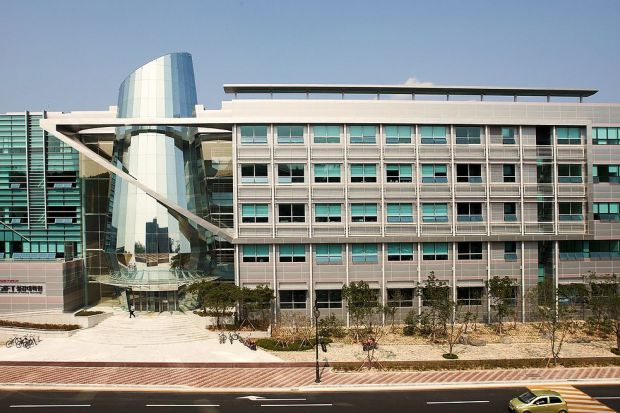POSTECH Announces 1.2 Trillion Won Investment Aimed at Becoming World’s Leading University
POSTECH is embarking on a groundbreaking endeavor with unprecedented investments aimed at initiating the second phase of its educational development program, known as POSTECH 2.0.
POSTECH was founded in 1986, and, in the capacity of a provincial, private, and small-scale institution, has managed to rise rapidly to become one of the Republic of Korea’s premier institutions of higher learning. By 2010, the university had gained international recognition by being placed 28th (among the Top 30) in the Times Higher Education World University Rankings. The World Bank has also hailed POSTECH as a paradigmatic model of “a world-class research university on the periphery.” This success story began with aggressive initial investments by the POSTECH Foundation, attracting talented students and establishing world-class research infrastructure. Consequently, more universities in Korea and elsewhere in Asia had emerged by following the POSTECH model.
Despite these achievements, POSTECH recognizes the need to go beyond the initial goal of becoming a “world-class research-oriented university.” Thus, a new vision has been set forth of attaining unparalleled excellence in education, research, and innovation. This ambitious aspiration entails significant investments not unlike those required when founding a new university, along with comprehensive reforms across all facets of university operations.
To realize this vision, the board of directors of the POSTECH Foundation passed a resolution on January 30 to invest a total of KRW 1.2 trillion over the span of ten years, from the current year until 2033.
○ POSTECH 2.0 Key Initiatives
– Establish a boundaryless education system inspired by the vision of POSTECH’s inaugural president, commonly referred to by his pen name, Mueunjae (無垠齋).
– Cultivate research fields to attain global leadership with initiatives such as “Made in POSTECH”
– Expand industry-academy collaboration and technology transfer for creating and promoting new industries
– Secure sustainable growth drivers to enhance competitiveness and achieve development goals
| Category | Area | Initiatives |
| 1 | Faculty (Research Innovation) | Attract and retain world-class scholars to enhance research competitiveness – Cultivate excellence in research fields to achieve global leadership – Attract and retain top domestic researchers |
| 2 | Student (Education Innovation) | Implement interdisciplinary education to break down barriers between majors and space/time – Strengthen efforts to attract outstanding individuals from both domestic and international pools – Establish a comprehensive support system for Mueunjae-inspired education and research – Nurture global leading Postechians |
| 3 | Management (Infrastructure Innovation) | Create a future-oriented campus town capable of accommodating the next 50 years – Expand educational and research infrastructure to prepare for the future – Provide the best living conditions in Korea |
○ Faculty (Research) Innovation
| Objective | Attract world-class scholars and bolster research competitiveness |
| Budget | – Recruit exceptional faculty: KRW 103.6 billion – Strengthen faculty competitiveness: KRW 112.4 billion – Promote R&D innovation: KRW 100 billion |
– Early Retirement Extension Program and Performance-based Non-accumulative Incentive System
- · Pioneer the early retirement extension program for faculty aged 50-55, a first in Korea (with retirement age extended to 70)
- → Provide a stable research environment for outstanding faculty members and facilitate the recruitment of mid-career researchers
- · Implement a performance-based non-accumulative incentive system (with payment amounts varying by up to more than double on average)
– Program to Appoint Distinguished Overseas Professors Concurrently
- · Recruit scholars from the world’s top 1 percent (based on Highly Cited Researcher criteria)
- · Establish local-global cooperation centers in overseas universities
- · Lay the groundwork for accelerated joint education, research, and international exchange efforts
– R&D Centers focusing on strategic local industries
- · Build R&D centers tailored to local strengths, such as the hydrogen, nuclear power, biotechnology, and semiconductor industries
○ Student (Education) Innovation
| Objective | Break down the boundaries between majors and space/time in education |
| Budget | – Innovation in undergraduate and graduate education: KRW 44.4 billion
– Globalization and student support: KRW 73.6 billion |
– Cultivate global leading Postechians
- · Path Finder Plus Program (undergraduate)
- Provide vouchers worth KRW 10 million for all undergraduate students
- (to encourage participation in experiential programs such as global engagement and entrepreneurship)
- · Premium Outbound Program (undergraduate)
- Dispatch students to top-tier universities in the United States to provide opportunities for world-class education and research
- · Customized Training Program (graduate)
- · Provide all doctoral students with opportunities for overseas dispatch (3 to 6 months) at least once
– Implement Muenjae-inspired education (undergraduate)
- · Off-Campus Semester System:
- Introduce a semester format that allows students to take online courses while engaging in practical experiences such as entrepreneurship projects and internships abroad
- · POSTECH Open Curriculum:
- Create customized interdisciplinary tracks within major fields to empower students with greater autonomy and foster convergence skills
– Implement a graduate student support system focused on research excellence (graduate)
- · Launch an autonomous research scholarship program with a target of 20 percent student participation
- · Ensure the highest stipends for graduate students among domestic universities
– Enhance domestic and international student recruitment
- · Introduce a non-Korean student admission system for undergraduates
- · Offer the Postechian welcome package, including tablet PCs and e-textbooks for undergraduate students
- · Improve support systems and enhancing living conditions for international graduate students
○ Management (Infrastructure) Innovation
| Objective | Pioneer a visionary campus town for the next 50 years |
| Budget | – Facility development: KRW 537.7 billion – Residential environment: KRW 166.6 billion – Administrative infrastructure: KRW 8.7 billion |
– Future-proofing educational and research facilities
- · Construct new educational and research buildings (2 for education and 2 for research)
- · Establish a state-of-the-art manufacturing innovation testbed center (Fab 3)
– Premier residential amenities
- · Construct faculty housing and dormitories

